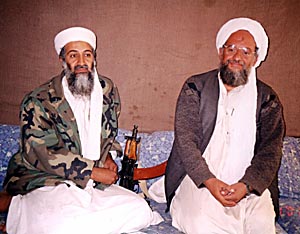A Rewarding Month for Al-Qaeda and its Allies
Publication: Terrorism Focus Volume: 3 Issue: 44

It has become common in the United States and the West to acknowledge the difficulty of integrating and making sense of the disparate, geographically diverse events that occur in the war on terrorism and to assess which side is winning. The first half of November, however, provides an opportunity for at least a snapshot assessment that suggests that, at this moment, al-Qaeda and its allies are winning the larger conflict. Let us first look at the major developments of the last fortnight that indicate the continued vitality of al-Qaeda and the jihadi movement.
Afghanistan: The pace of the Taliban-led insurgency continues to accelerate, and Taliban officials say that they intend to maintain the present intensity during the winter. In addition, Western officials report that the size of Taliban combat units is increasing, as are their tactical proficiency and the sophistication of their weapons [1]. This reporting, in turn, suggests manpower is not a problem for the Taliban, that local populations are at least acquiescing in the group’s presence and activity and that training facilities have been reestablished in Afghanistan and Pakistan. Also supporting the conclusion that Taliban manpower is abundant is the recent report that al-Qaeda is sending fighters from Afghanistan to other theaters, especially Europe and the Arab countries (CBS Evening News, November 10).
Yemen: On November 7, al-Qaeda’s organization in Yemen—al-Qaeda of Jihad in Yemen—claimed responsibility for the September 15 suicide attacks on two Western oil companies: Nexen Petroleum of Canada and Hunt Oil of the United States. Minimal damage appears to have been done in the attacks, but the communiqué said that more attacks on oil targets would occur because of orders from “our leader and commander Sheikh Osama bin Laden.” (NB: It is probably safe to conclude that if al-Qaeda redeploys fighters out of Afghanistan, some will go to Yemen and the other Gulf states to assist in attacks on energy facilities that have been ordered by bin Laden and al-Zawahiri.) Yemen’s al-Qaeda unit noted that it had recovered from the serious defeat it suffered when U.S. forces killed its leader, Abu Ali al-Harithi, several years ago. In its statement, Yemeni al-Qaeda also contributed to al-Qaeda’s emphasis on the importance of the Iraq insurgency to the jihadi movement by naming one of the attacks in honor of the late Abu Musab al-Zarqawi.
Great Britain: In a rare public statement, the director-general of the British security service MI5, Dame Eliza Manningham Buller, described the “steady increase in the terrorist threat to the UK,” and concurred with London Metropolitan Police’s judgment that “al-Qaeda-related terrorism ‘is real, here, deadly and enduring.'” Dame Eliza claimed “five major conspiracies in the UK” had been halted since mid-2005, but that MI5 was aware of nearly 30 ongoing terror plots and was monitoring “some 200 groupings or networks, totaling more than 1,600 identified individuals (and there will be many we don’t know) who are actively engaged in plotting [and] facilitating terrorist acts here or overseas.” Dame Eliza also said that plots in the UK “often have links back to al-Qaeda in Pakistan and through those links al-Qaeda gives guidance and training to its largely British foot soldiers here on an extensive and growing scale.” In conclusion, the MI5 chief admitted that her service could not prevent all attacks in the UK, adding that the threat would be with Britain “for a generation,” a claim seconded by Prime Minister Tony Blair [2].
The dire MI5 assessment resonates with other events covered here. Dame Eliza’s claim that al-Qaeda in Pakistan is training British jihadis supports the idea that bin Laden’s forces have reestablished South Asian training facilities. In addition, her clear inference of the existence of significant two-way travel of information and individuals between al-Qaeda in Pakistan and al-Qaeda-related UK groups, suggests that some of the al-Qaeda fighters being sent out of Afghanistan may go to Britain. A final note that will please al-Qaeda was the Dame Eliza-Prime Minister Blair refrain that it will take the UK a generation to defeat the threat. For al-Qaeda, this is a clear signal that British leaders still believe they face a limited threat that can be defeated over time, a conclusion which Islamist leaders—who know their forces are growing geometrically—will welcome as a self-defeating delusion.
Iraq: On November 10, al-Qaeda in Iraq leader Sheikh Abu Hamza al-Muhajir welcomed the U.S. Democratic Party’s control of both houses of Congress, and applauded U.S. voters for taking al-Qaeda’s advice by “voting with some sense” and acting to “put their feet at the beginning of the right path [that is, withdrawal from Iraq] to save themselves from their predicament.” Al-Muhajir said that the pending U.S. withdrawal is coming “sooner than we hoped and faster than we reckoned,” and asked U.S. leaders to slow down “because we have not quenched our thirst from your blood yet.” The al-Qaeda chief also tried to goad the United States into remaining by playing on Washington’s fears of Iran, citing the pending emergence of an Iran-backed “Shiite Crescent” in the Middle East. “Hence, the Old Persian Empire has become complete, extending from the countries behind the rivers, Iran and Iraq…to the Levant,” al-Muhajir claimed, adding that it has been the U.S. administration’s actions that “revived their [the Persians] old glory without [the Persians] having to fire one bullet or sacrifice one soldier” [3].
Al-Muhajir also continued al-Qaeda’s effort to undo some of the damage done by al-Zarqawi’s extremism and failure to fully cooperate with the Iraqi resistance. Al-Muhajir urged now independent groups to join the Mujahideen Shura Council in Iraq, and reasserted his support for Abu Omar al-Baghdadi, the leader of the Iraqi resistance. “I pledge allegiance to you to hear and obey during good and bad times,” al-Muhajir said, and went on to say that he was “putting at your [al-Baghdadi’s] disposal and direct orders 12,000 fighters, who constitute the army of al-Qaeda…as well as 10,000 others who are still not fully prepared materially.” (NB: This total appears quite high, but whatever the accurate number, it could be augmented by a redeployment from Afghanistan.) Al-Muhajir also continued to rein in the indiscriminate violence al-Zarqawi initiated against non-combatants. “You should respect the status of the people, especially the ulema, the tribal chiefs and the notables,” al-Muhajir told his fighters. “The farmer in his farm, the worker in his factory and the teacher in his school has the right to be supported by us. We protect their honor and money and do not speak badly about them even if they are not part of the jihad and its people” [4].
United States: Beyond these positive developments, bin Laden, al-Zawahiri, their lieutenants and other jihadi leaders believe that they are on the brink of far greater good fortune—the much-talked-about “new direction” of U.S. policy in Iraq which may yield a near-term, phased withdrawal of the U.S.-led coalition’s forces. Quite simply, that decision would allow bin Laden to score, in the perception of most Muslims, an unprecedented hat-trick of successes; U.S. withdrawal would: (1) Allow the redeployment of many Iraq-based foreign fighters to the Arabian Peninsula, Europe, the Levant and the Horn of Africa; (2) Dramatically increase bin Laden’s stature as a leader—and almost a prophet—by disproving the Islamist leaders who damned him for bringing down the “unbeatable military wrath” of the United States on Muslims via the 9/11 attack and validating his contention that Washington lacked the will and ruthlessness to defeat Islamist forces; and, by far the most important, (3) Exponentially surpass the motivational power of the Afghan-Islamist defeat of the Soviet Union via the Arab-Islamist defeat of the United States, the world’s second and last superpower.
Notes
1. Multiple recent articles by Jason Burke and Declan Walsh in the London Guardian. The most recent is Declan Walsh, “As Taliban insurgency gains strength and sophistication, suspicion falls on Pakistan,” Guardian, November 13, 2006.
2. “Terrorist threat to UK – MI5 chief’s full speech,” Times Online, November 11, 2006; Alan Cowell, “Blair says homegrown terrorist threat is generation-long struggle,” New York Times, November 12, 2006.
3. Sheikh Abu Hamza al-Muhajir, “The command is for none but Allah,” Internet, November 10, 2006.
4. Ibid.




